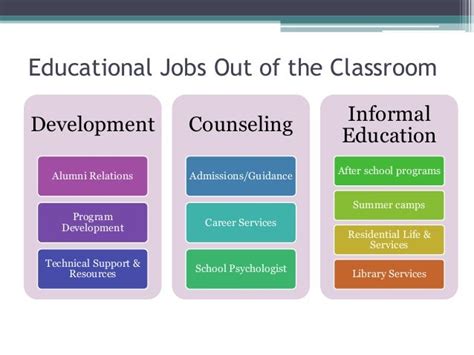With the ever-changing landscape of education, more and more individuals are seeking employment opportunities beyond the traditional role of a teacher. The field of education is vast and offers a diverse range of positions that cater to various skills, interests, and ambitions.

Beyond the Classroom: Exploring Diverse Roles in Education
Beyond the classroom, education encompasses a plethora of roles that contribute to the success and well-being of students. These include, but are not limited to:
-
Educational Administrators:
- Superintendents
- Principals
- Assistant Principals
-
Curriculum Specialists:
- Curriculum Directors
- Instructional Coaches
-
Guidance Counselors:
- School Counselors
- College and Career Counselors
-
Support Staff:
- Librarians
- Media Specialists
- School Nurses
-
EdTech Professionals:
- Instructional Designers
- Learning Management System Administrators
Specialized Skills for Specialized Roles
Each role in education requires a unique set of skills and qualifications. For instance, educational administrators need strong leadership and management abilities, curriculum specialists require expertise in educational theory and instructional design, and guidance counselors are expected to possess exceptional communication and counseling skills.
The Growing Demand for Education Professionals
The demand for skilled education professionals is on the rise, as schools strive to meet the evolving needs of students and the education system. According to the Bureau of Labor Statistics (BLS), the overall employment of education administrators is projected to grow by 8% from 2021 to 2031, while the job outlook for school counselors is even more promising, with a projected growth rate of 10%.
Matching Skills to Role
Identifying the right role in education depends on an individual’s skills, interests, and career aspirations. To make an informed decision, consider the following:
- What are your strengths and areas of expertise?
- What aspects of education do you find most compelling?
- What type of work environment do you prefer?
Table 1: Education Job Titles and Corresponding Skill Sets
| Job Title | Key Skill Sets |
|---|---|
| Educational Administrator | Leadership, Management, Decision-Making |
| Curriculum Specialist | Instructional Design, Curriculum Development, Data Analysis |
| Guidance Counselor | Communication, Counseling, Student Advocacy |
| Librarian | Information Literacy, Collection Development, Technology Integration |
| Instructional Designer | Education Technology, Learning Theory, User Experience Design |
Table 2: Education Job Functions and Responsibilities
| Job Function | Typical Responsibilities |
|---|---|
| Curriculum Development | Planning, designing, and implementing curriculum |
| Student Counseling | Providing academic, personal, and career guidance to students |
| School Administration | Managing the operations of a school |
| Library Services | Managing library resources, assisting patrons with research |
| Educational Technology | Integrating technology into the learning environment |
Table 3: Education Job Salaries and Career Paths
| Job Title | Median Salary (2022) | Career Path |
|---|---|---|
| Educational Administrator | $100,700 | Superintendent, Chief Academic Officer |
| Curriculum Specialist | $85,740 | Curriculum Director, Instructional Coach |
| Guidance Counselor | $61,720 | School Counselor Supervisor, College and Career Counselor |
| Librarian | $60,700 | Library Director, Information Specialist |
| Instructional Designer | $78,880 | Learning and Development Manager, Instructional Technology Coordinator |
Table 4: Where to Find Education Jobs
| Job Board | Description |
|---|---|
| EducationCareerFairs.com | Largest online job board for education professionals |
| Professional networking site with a dedicated section for education jobs | |
| National Association of School Psychologists (NASP) | Job postings for school psychologists and related fields |
| American Library Association (ALA) | Job listings for librarians and other library professionals |
FAQs: Uncovering the Mysteries of Education Jobs
1. What are the educational requirements for education jobs other than teaching?
Educational requirements vary depending on the role. Most positions require a bachelor’s degree and some may require additional education, such as a master’s degree or certification.
2. What are the benefits of working in education?
Working in education offers various benefits, including job security, opportunities for professional development, and the chance to make a positive impact on students’ lives.
3. How can I find education jobs in my area?
There are several ways to find education jobs, including job boards, professional organizations, and school district websites.
4. What are the career advancement opportunities in education?
With experience and additional qualifications, individuals can advance their careers to leadership positions within education, such as superintendent or principal.
5. How can I determine if a role in education is right for me?
Consider your skills, interests, and career aspirations. Research different roles and connect with professionals in the field to gain firsthand insights.
6. What are the challenges of working in education?
Working in education can be demanding, with challenges such as limited resources, large class sizes, and student behavior issues. However, the rewards of making a difference in students’ lives often outweigh these challenges.
7. What are the salary expectations for education jobs other than teaching?
Salaries vary depending on the role, experience, and location. According to the BLS, the median annual salary for educational administrators is $100,700, while school counselors earn a median salary of $61,720.
8. How can I stay updated on trends and innovations in education?
Attend conferences, read industry publications, and connect with professionals on social media to stay abreast of the latest developments in education.
